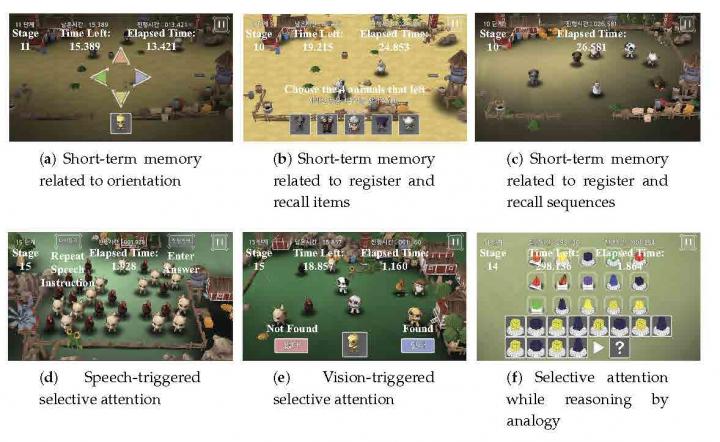UMass Amherst researcher awarded NIH grant to measure effects of mobile game-playing

Credit: UMass Amherst
A University of Massachusetts Amherst biomedical informatician will use a $436,836 grant from the National Institutes of Health (NIH) to explore the use of “serious games” played independently on computer tablets to improve brain function in older people with mild cognitive impairment (MCI).
Sunghoon Ivan Lee, assistant professor in the College of Information and Computer Sciences, aims to develop a human-centered platform that can motivate patients to stick to a therapeutic regimen of mobile game-playing at home on their own. Neuro-World, a collection of six games developed by Lee’s industrial partner in South Korea, Woorisoft, is designed to stimulate working, or short-term, memory and selective attention.
People with MCI experience cognitive decline beyond what’s expected from normal aging, but not severe enough to significantly interfere with their daily activities. “There aren’t many solutions to stimulate cognitive ability in people with cognitive disabilities, especially in their homes, outside clinical settings,” says Lee, whose research focuses on designing and implementing mobile-health (mHealth) technologies that address the practical needs of people with motor or cognitive impairments.
The goals of therapeutic treatments for MCI are to slow down the progression of the disease and lessen the impact of symptoms, preferably with non-pharmacological interventions like serious games because they are low cost, noninvasive, safe and without adverse side effects.
Lee’s work addresses a key challenge of serious games in healthcare – developing a system that doesn’t require substantial involvement of trained caregivers and clinicians to oversee and motivate patients to follow the game protocol. Lee was introduced to Neuro-World by Hee-Tae Jung, a former post-doctoral researcher Lee had supervised at UMass Amherst. “I was intrigued by the Neuro-World concept and the science behind it,” Lee says.
In a small, pilot study with stroke survivors to validate the efficacy of the system, Lee, Jung and colleagues found that Neuro-World games were capable not only of improving patients’ cognitive function but predicting the expected improvement, based on an analysis of their game performance.
“We hope that knowing playing games can improve their cognitive function can further motivate patients to play more games,” Lee says.
Using the NIH funding, researchers at UMass Amherst, University of Montreal and Rutgers will conduct a study with 50 people diagnosed with MCI. Half will be asked to play the video games for 30 minutes twice a week for 12 weeks. The other half will not play the Neuro-World games. Both groups will also receive conventional therapy.
In addition to evaluating the ability of game-playing to improve cognitive function, researchers also aim to develop machine learning-based algorithms to predict cognitive function from the game performance. Finally, Lee and colleagues will conduct in-depth interviews with participants to understand their experiences with the games. They will use that information to optimize the system’s design in an effort to maximize patients’ participation with the game-based training.
“We thought people with MCI would be the population that could really benefit from serious games – before they move into a more serious condition like dementia or Alzheimer’s,” Lee says.
He hopes the study will advance the research and expand the options for effective, safe and low-cost mHealth therapies for people with cognitive impairments.
“We believe that outcomes of this project will open a new door leading to previously unexplored datasets and understanding of patient-technology interactions to promote positive behavior changes to enable self-administered, serious game-based cognitive training,” Lee says. “And that can form the basis of a wide range of future investigations of hemiparesis rehabilitation and personalized disease management.”
###
Media Contact
Patty Shillington
[email protected]
Original Source
https:/




